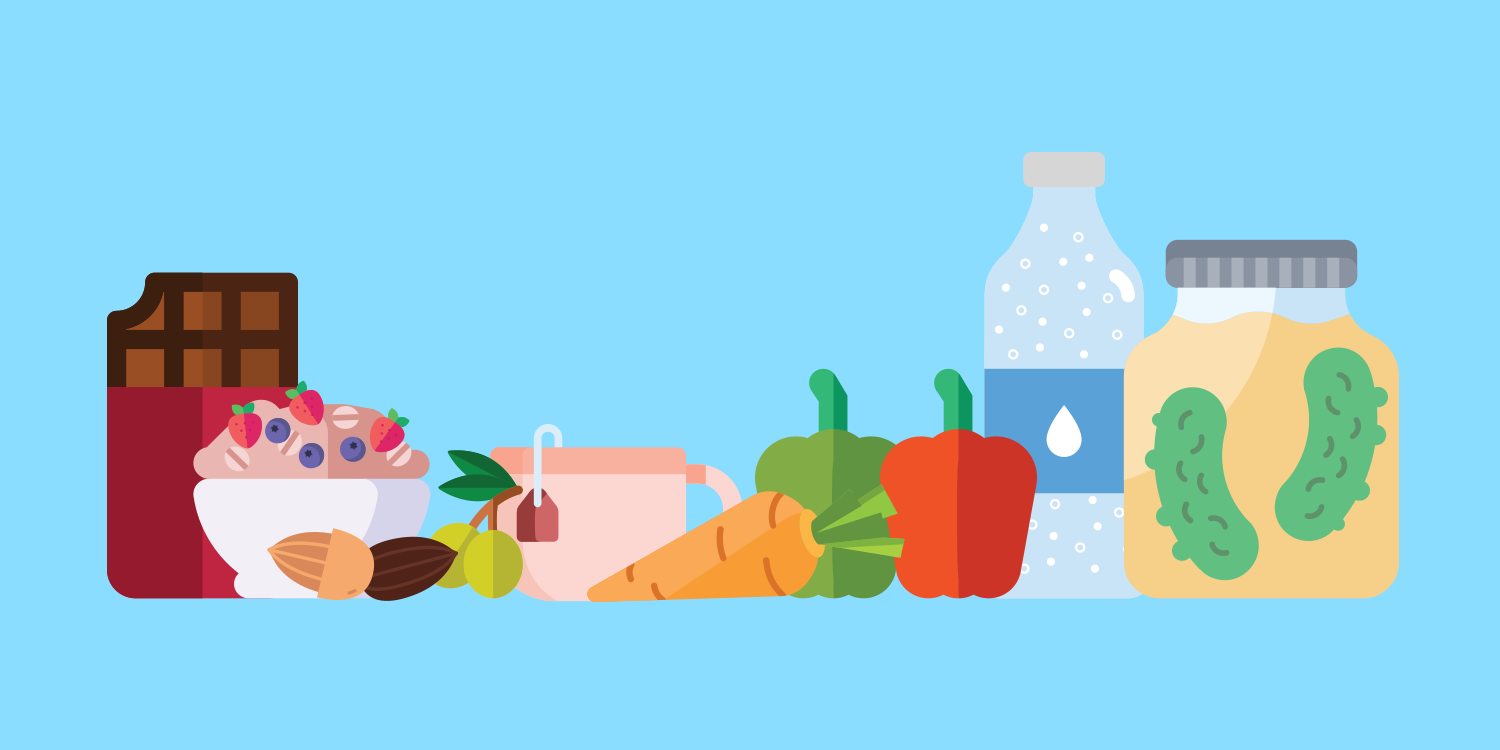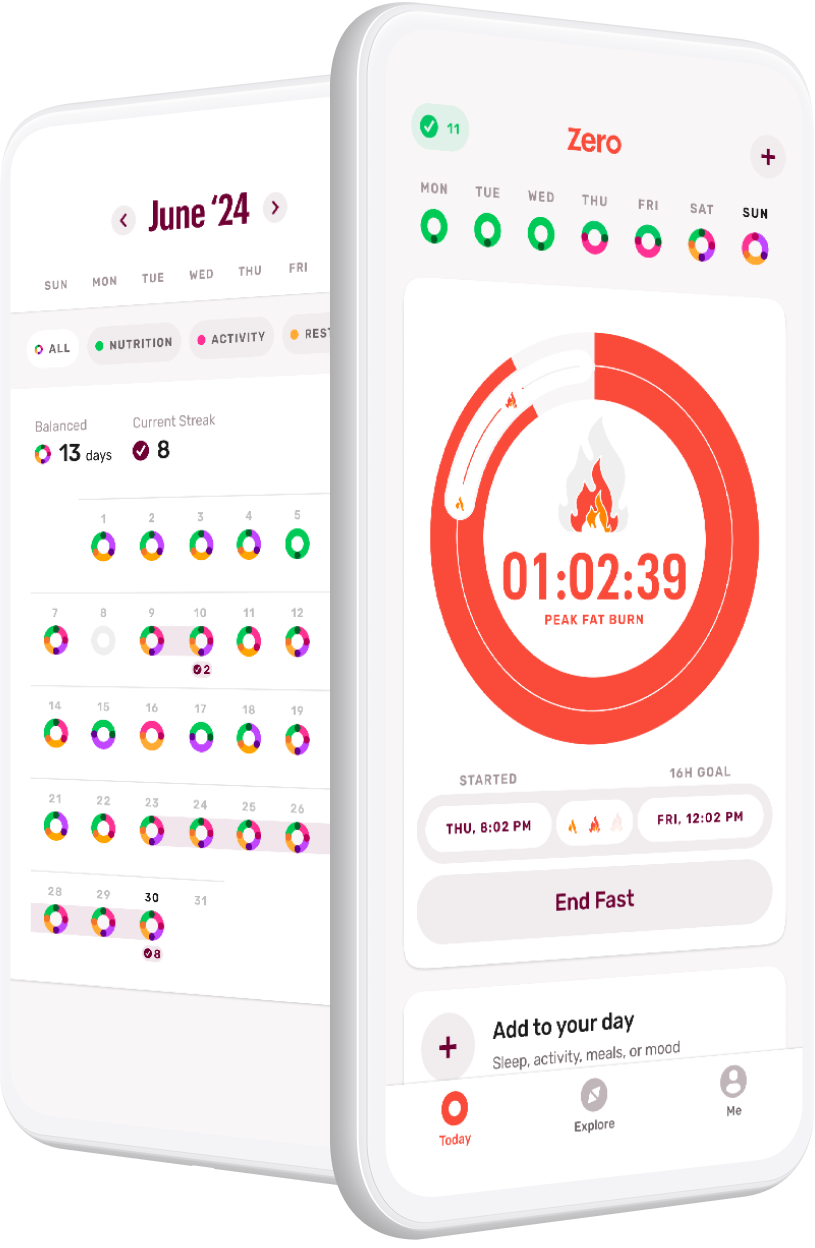That’s right, we said the S word…snack. It’s a polarizing term, we know. Fasting is a tool used by many in the Zero community to avoid any type of mindless grazing outside of an eating window or dedicated meal, and that’s great!
That being said, we have to acknowledge that no one’s eating behavior is perfect at all times. There are days that some choose not to fast (which is quite alright), times when schedules make planned meals difficult if not impossible, or moments when eating windows are filled with constant temptations and challenges. Snacking can especially seem inevitable when you’re at home 24/7, experiencing emotional triggers like boredom and stress.
The food industry has seen huge sales increases in snack items over the last few months, specifically in popcorn, pretzels, potato chips, pastries, ice cream, chocolate, and soda—all tempting treats, but not great for our health. So, if snacking is going to happen sometimes, how can we ensure it doesn’t derail our health and wellness goals? Our nutritionist has rounded up some suggestions in the form of simple snack swaps.
Popcorn
Buttery, salty, crunchy perfection for a movie night…or midday snack break. However, corn is a bit controversial, especially in the prepackaged, popped form.
The biggest concerns with corn surround the crop production, how it’s prepared, and the ingredients it’s often mixed with. Most of our corn supply is non-organic and comes from GMO/roundup ready crops. Microwave popcorn specifically has been questioned for the added chemicals found in the packaging, and the inclusion of industrialized, pro-inflammatory oils (and sometimes sugar). In addition to that, some people may also have an inflammatory immune response to corn that’s similar to wheat.
While there are lots of downsides to pre-packaged, microwave popcorn, you might still want to enjoy a fluffy, popped snack. In which case, non-GMO, organic kernels that you cook yourself are the way to go. Use an air popper, or if you’re popping your kernels in oil, use avocado oil to incorporate some healthy monounsaturated fatty acids. Popcorn can provide you with some fiber and it’s low in calories depending on how you pop it. Just be mindful of portion sizes and consider pre-portioning to prevent overindulging.
The best popcorn swap of all? Nuts! Another crunchy, salty item that can satisfy a savory craving. Almonds, hazelnuts, and macadamia nuts are highest in the heart-healthy monounsaturated fats, with cashews and pistachios coming in as a close second. Raw, sprouted, and soaked nuts will provide the most nutrients. If you want some extra flavor, just make sure to avoid brands that use industrialized oils, sugar, and other additives/preservatives…or consider flavoring them yourself.
It’s easy to go a little nuts with nuts, so again, consider pre-portioning these before you dive in to avoid overeating.
Swap out microwave, pre-made popcorn for organic, home-made popcorn or nuts.
Pretzels
Pretzels are another snack we usually reach for when we want a salty, crunchy fix. The downside: they’re often made with refined flours and are a concentrated source of high-glycemic carbs, which can have a major impact on our blood sugar and energy levels.
So let’s focus on some low-carb options that are still salty and crunchy like veggies (raw or roasted), olives, or nuts—all things that will provide you with fiber, vitamins, minerals, and some protein and healthy fats.
Kale and seaweed are nutrient-packed and can be turned into a crispy snack—just add heat! Roasted seaweed snacks or baked kale chips are two options that you can make at home or buy pre-made.
Olives can also be enjoyed on their own. The different types (black, kalamata, green, etc.) and variations (blue cheese, jalapeno, garlic stuffed, etc.) keep this snack from being anything but bland.
Final idea: grind up nuts into a butter and serve with raw vegetables to get that salty, fresh crunch. Carrots, celery, cucumbers, and bell peppers are easy veggies to slice and dip.
Swap out pretzels for roasted kale or seaweed crisps, olives, or fresh vegetables and nut butter.
Potato Chips
Potato chips are arguably one of America’s favorite snacks. With so many options and flavors, there are endless chip temptations. Unfortunately, potato chips are a highly processed, high-glycemic food that simply aren’t good for our bodies. On top of that, most potato chips are cooked in industrialized oils like “vegetable oil,” corn oil, and soybean oil that are pro-inflammatory.
There are few different ways to fill the potato chip void. Pork rinds are a tasty, low-carb, high-protein option. Just make sure they’re organic and use minimal ingredients. The ingredients label should only say pork skin, salt, and maybe some other herbs/spices like pepper or paprika.
Pickles are another guilt-free option that are low in calories and provide some salty, tangy flavor. For the added probiotic benefit, choose traditional pickles that are fermented in well water instead of vinegar.
Finally, cheese is a low-carb, savory selection that can also be made crispy. Parmesan or cheddar crisps that are baked in the oven are an easy swap. You can make these at home or purchase them pre-made.
Swap potato chips for organic pork rinds, pickles, or cheese crisps.
Pastries
Pastries are a popular comfort food—hello, flaky, buttery, sweetness. Unfortunately, pastries are packed with added sugars, processed carbs, and unhealthy fats. So let’s find a better option to satisfy that sweet tooth!
Coconut is a great alternative that’s naturally sweet, but lower in carbs, and has fiber and some healthy fats as well. Even though the majority of fat coming from coconuts is saturated, it’s high in medium chain triglycerides (MCTs), which have been shown to have some beneficial health properties. In order to get the healthy fats and fiber, you want to make sure you’re eating the pulp and not just the juice. Coconut chucks or coconut butter are a couple of options to enjoy a naturally sweet taste.
Coconut can also be used in a grain-free granola when dried. There are some fun recipes to try at home, and instead of using maple syrup or another sweetener, consider using a sugar-free sweetener such as erythritol, monk fruit, or stevia…or no sugar at all.
Finally, cinnamon is a great spice swap since it gives the illusion of sweetness without the actual sugar. Look for cinnamon flavored nuts at the store, or make your own.
Swap out pastries for coconut butter, grain free granola, or cinnamon nuts.
Ice Cream
We all scream for ice cream, right? There’s certainly a time and place for the occasional ice cream cone, but it likely shouldn’t be something we have in our normal nutrition routine. We can fulfill the craving for a cold, creamy, sweet treat with some options that aren’t so condensed with added sugars.
Heavy cream (and for the non-dairy person, coconut cream) can be a silky substitute. Whip either option and freeze to get a cold treat that’ll make you forget about the actual ice cream. Coconut cream is usually sweet enough on its own, but if heavy cream is too bland, you can add a small amount of monk fruit, stevia, or erythritol before whipping. To get some natural sugar along with healthy fiber, micronutrients, and antioxidants, top the whipped cream with berries.
Swap out ice cream for whipped coconut cream or heavy cream and berries.
Chocolate
Chocolate can actually be a healthy part of our diet and provide us with micronutrients like copper and magnesium, as well as flavonoids which provide antioxidant benefits. However, we can run into trouble when we consume it too much, too frequently, or choose options that are higher in added sugars.
Instead of turning to white or milk chocolate, which can have as much as 50 grams of added sugar per bar, choose the dark chocolate options. Ideally, you would have 85% cocoa or higher, and the ingredient list should be very short, usually something along the lines of cocoa powder/solids, cocoa butter, sugar, and vanilla. Other ingredients like almonds, salt, or peppermint are fine, but try to avoid options with added sugar in the form of caramel, nougat, or honey.
It’s important to note you can have too much of a good thing. Opt for a few small squares instead of the entire bar.
Swap out milk chocolate, white chocolate, and candy bars for 85% dark chocolate.
Soda
Most of us realize that sodas and sugary drinks are a no-no. Recent research around glucose intolerance and artificial sweeteners in animals has raised some questions about diet sodas and sugar substitutes as well. So, what should we turn to when we’re looking for a refreshing, bubbly beverage?
Sparkling water is the best alternative to sodas that give you the fizz without the fear of sugar consumption. Plain carbonated water, or carbonated water flavored with fruit essence are great swaps.
If you don’t need the bubbles, but plain water isn’t cutting it, consider finding a sugar-free herbal tea or flavoring your water by adding berries, lemon slices, or herbs.
Swap out soft drinks for sparkling water, herbal tea, or water flavored with fresh ingredients.
In Summary
Snacking doesn’t have to be a bad word, and it can easily be a small part of a still-healthy nutrition routine. By making some simple swaps that prioritize whole, minimally processed, low-sugar foods, we can still enjoy a mid-day treat without the guilt. As a reminder, here are the 7 simple swaps you should try out if you feel a snack attack coming on:
- Swap out microwave, pre-made popcorn for organic, home-made popcorn or nuts
- Swap out pretzels for roasted kale or seaweed crisps, olives or fresh vegetables and nut butter
- Swap potato chips for organic pork rinds, pickles, or cheese snacks
- Swap out pastries for coconut butter, grain free granola, or cinnamon nuts
- Swap out ice cream for whipped coconut cream or heavy cream and berries
- Swap out milk chocolate, white chocolate and candy bars for 85% dark chocolate
- Swap out soft drinks for sparkling water, herbal tea or water flavored with fresh ingredients
- The Complete Guide to Fat Burning - April 30, 2024
- Zero Live #4: 3 Ways to Boost Fat Burning - March 28, 2024
- Zero Live #3: Nutrition, Fast Breakers, and Fasting - March 11, 2024





